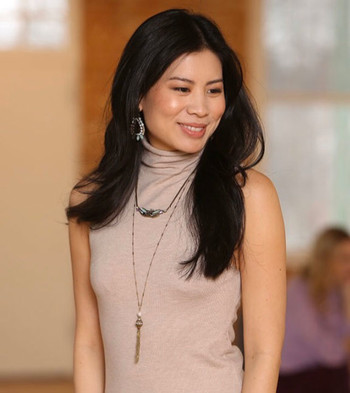When Ying Laohachewin ’15BUS lost her mother more than a decade ago, she struggled to find support from people who could fully understand her grief. “I had access to therapy, but I couldn’t find a path that was truly helpful for my recovery,” she says. Years later, while going through a difficult breakup, she experienced a similar feeling of isolation. “None of my friends were dealing with heartbreak at the time. When I’d encounter anyone who was, I’d realize how powerful it was to talk to someone who understood my situation.”
Now Laohachewin is the cofounder of Inward, a startup aimed at making the healing process more supportive, accessible, and communal with the help of an increasingly sophisticated tool: artificial intelligence. “We use AI to facilitate peer support for women going through big life transitions,” explains Laohachewin, who started Inward in 2021 and currently runs it out of the Columbia Startup Lab. The company’s signature “breakup program,” which costs $8.99 a month, connects women in the midst of romantic crises with peer support groups through text messaging. Discussions, covering topics such as shame, loneliness, and abandonment, are guided by auto-generated text (derived from writing by therapists) that’s responsive to the group’s conversation.
Laohachewin, the daughter of a diplomat, is originally from Thailand and grew up in Europe. She studied law in London and briefly worked as an attorney before moving to New York to attend Columbia Business School. After almost seven years working in business development and e-commerce for Amazon, Laohachewin teamed up with Karishma Daswani, a wellness entrepreneur, to cofound Inward as a way to help other women overcome the types of mental-health challenges that both of them had personally faced. “We realized there was a dearth of services for cultivating peer support, a powerful and underleveraged healing modality,” says Laohachewin.
Inward’s breakup program, which was designed with input from clinical psychologists and relationship experts, provides users with behavioral-health exercises such as meditation and the writing of personal affirmations and also offers learning modules on topics like understanding relationship patterns. While the activities and peer groups are not necessarily meant to replace clinical therapy, Laohachewin believes they can serve as useful supplements. “Most people don’t go to therapy more than once a week. For the rest of the time, where’s the support? There are also many people who don’t have access to therapy at all because it’s expensive.”
Laohachewin and Daswani are now trying to expand Inward’s customer base — more than a thousand have used the platform to date — and plan to focus on situations beyond breakups, divorce, and cheating. “There are so many situations that require emotional support, whether postpartum depression, parenting, dealing with grief and loss, or navigating career changes,” says Laohachewin. Currently, Inward is testing a program for people who are actively dating, which could be incorporated into dating apps.
With so many of life’s activities — from work to relationships to doctor’s appointments — taking place through our screens, Laohachewin believes in technology’s potential to facilitate meaningful human connections. “Generally, friendship is on the decline worldwide,” she says. “People are more and more connected with the Internet, yet many feel increasingly disconnected emotionally. So many women report not having a friend they can talk to. I think there’s a real need for a platform that connects people with others who are going through the same things.”
Are you a Columbia graduate who has founded an innovative company? Tell us about it!
Are you a Columbia graduate who has founded an innovative company? Tell us about it!




